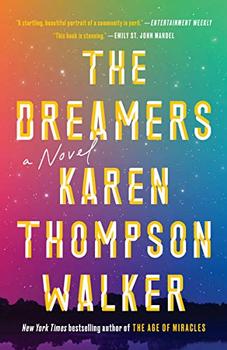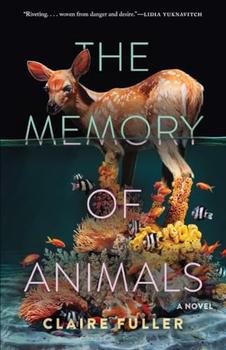Summary | Excerpt | Reading Guide | Reviews | Beyond the book | Read-Alikes | Genres & Themes | Author Bio

A strange new disease emerges in Santa Lora, California, an isolated college town with a history of death and devastation; even before the disease pops up, a drought has been slowly consuming the town's lake. The afflicted fall into a deep sleep, and each victim has unprecedented brain activity that suggests they are dreaming. Some pass away, and others rest in hospital beds as healthcare professionals struggle to understand the quick-spreading outbreak. The basic premise is fascinating, and the events of the novel unfold as quickly as the sleeping sickness spreads, creating a page-turning flow that unites the disparate characters trapped by a quarantine in Santa Lora.
The point-of-view in The Dreamers shifts from the omniscient, community-wide experience to intimate third person accounts of several characters. Karen Thompson Walker considers the effects of the disease (and ensuing quarantine) through both personal and collective lenses. This allows readers to grasp contextual information that would have been unknown to the main characters, and permits the author opportunity to further the existential themes and questions asked throughout the piece. Each character's perspective ties into a greater, universal question that urges the reader to think about what it means to be human.
Mei feels alone in college, and she craves the easy amicability her classmates seem to share. Yet she blossoms in this tragedy, while so many others fall apart. In one of the author's most overt mechanisms employed to question the value of a life, Mei's classmate shares with her the philosophical trolley problem. (Would you alter the direction of a runaway trolley if it meant rescuing five people from certain death, but dooming another person?) Mei must contemplate how theoretical answers in a college classroom vary from those made under pressure, and how one might prioritize the lives of strangers with the lives of loved ones.
Nathaniel is a biology professor helplessly watching as dementia consumes his partner. What did those years together mean, now that they're in the past? Is his partner even the same person without his memories or his mind? Nathanial even contemplates the blackest thought: would it have been better if his partner had died before the dementia set in? Should he have killed him?
Ben and Annie are new parents, and even before their daughter's birth their marriage was strained. They wonder if their best years are behind them, and what the sleeping sickness might mean for their daughter's future. Sara and Libby are children trying to understand the world and their doomsday-prepper father; they know he's been wrong about the end of the world before, but this time it appears he's right. Have they been too dismissive? Who can they trust besides each other? Still more vibrant characters round out a cast with remarkable complexity experiencing the high stakes of a looming sleep that might mean death for any one of them.
While the plot and characters are both strong, The Dreamers really shines when it is introspective. Dreams are unique, personal, hard to describe, and offer a plethora of readings. One of the characters, an English professor, thinks about his own dream:
To those who believe in the fixed meanings of dreams, the loss of teeth is significant, symbolic of anxiety or fear. They would say that the dream presaged what will happen in the morning and maybe everything that happens after that. But he is always trying to lure his students away from those kinds of readings, asking them to be more expansive in their thinking, less obvious, less easy, more true. All they want are the answers, those kids, a grand order of things, as if every story were only the code for something else.
The author asks readers to engage with complexity, to consider ascribing significance to dreams, but also to consider the possibility that there is no significance to them. She asks that the ideas of destiny and fate be considered, but not necessarily accepted as fact. Ultimately, this passage and the novel as a whole are considering the possibility of a real, concrete truth; life, just like dreams, can't always be given a conclusive reading. Not everything can be predicted, explained or packaged nicely with a bow. Some things are unknowable, or offer several plausible interpretations. By the end of the novel, many questions have been asked. What is real? What is right? How do we experience life, and how do we experience time? We're asked these questions about characters' waking and dreaming lives, but Walker also seems to be asking the reader to examine their own life in the same way. The novel doesn't offer up easy answers; the story concludes, but the author does not spell out its meaning, allowing the reader to come to their own conclusions and interpretations. The Dreamers is a shining example of what Jean-Paul Sartre described as "a pact of generosity between the author and the reader." Great books like this invite an exchange of ideas and interpretations, each a gift in and of itself.
As a lover of disease thrillers, I knew immediately I wanted to read this novel. The epidemiological questions were interesting, and I wanted to know the illness's secrets. But The Dreamers has an interiority that makes it rise above categorization as a simple mystery. This is a story about people, about communities; it is much less about the disease than it is about the people the disease affects. Going in, I worried that the dream sequences would feel overwrought. After all, dreams are so intangible that they are difficult to write about; as the English professor noted in the above quote, they are as complex and multi-faceted as the people having them. I never felt that The Dreamers took an easy reading of dreams. Instead, the novel moved me and made me consider the questions it posed long after I turned the last page.
![]() This review was originally published in The BookBrowse Review in February 2019, and has been updated for the
November 2019 edition.
Click here to go to this issue.
This review was originally published in The BookBrowse Review in February 2019, and has been updated for the
November 2019 edition.
Click here to go to this issue.

If you liked The Dreamers, try these:

by M. L. Rio
Published 2024
The author of sales sensation If We Were Villains returns with a story about a ragtag group of night shift workers who meet in the local cemetery to unearth the secrets lurking in an open grave.

by Claire Fuller
Published 2024
From the award-winning author of Our Endless Numbered Days, Swimming Lessons, Bitter Orange, and Unsettled Ground comes a beautiful and searing novel of memory, love, survival—and octopuses.
Your guide toexceptional books
BookBrowse seeks out and recommends the best in contemporary fiction and nonfiction—books that not only engage and entertain but also deepen our understanding of ourselves and the world around us.